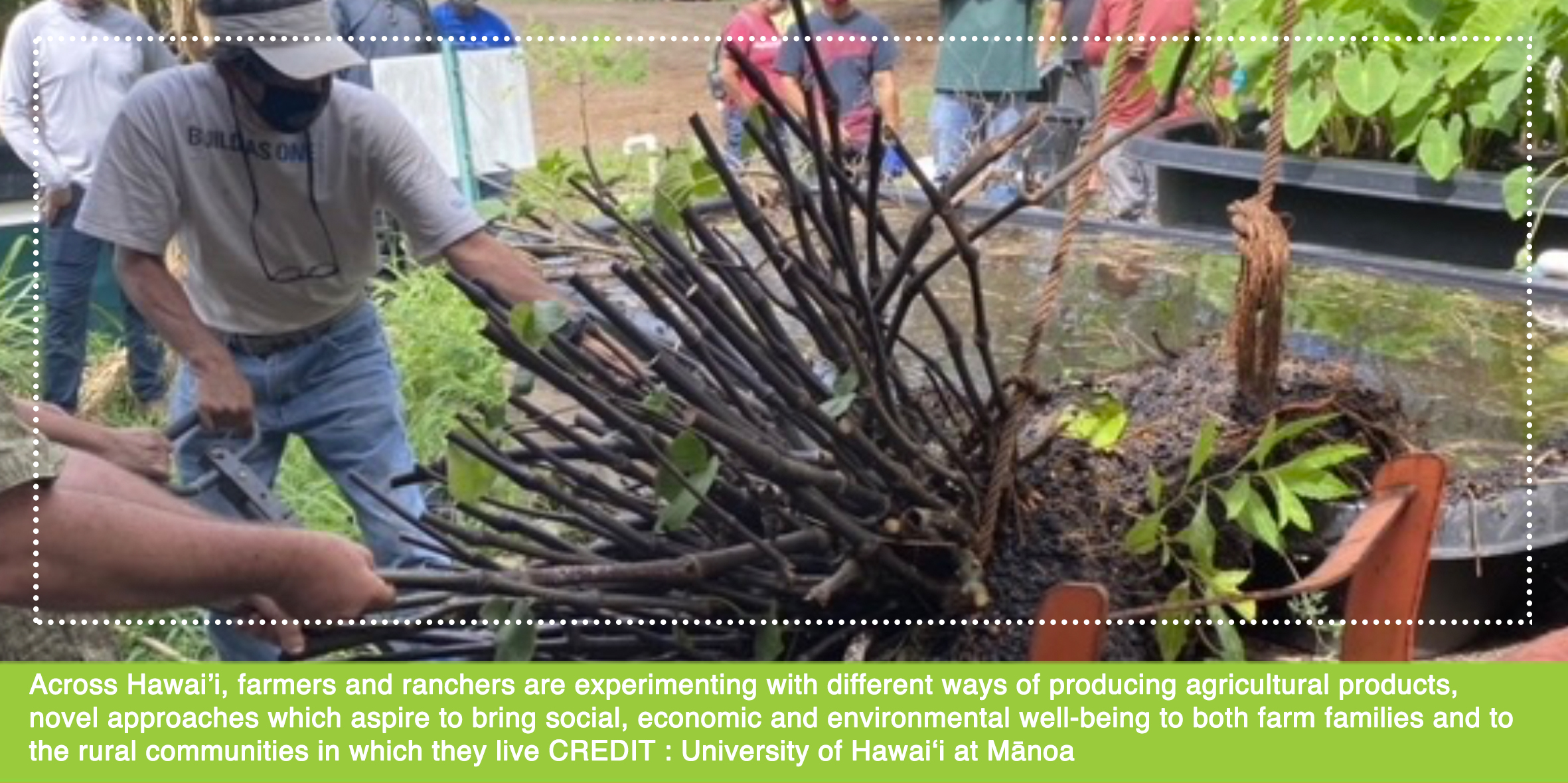b l o g
n o v e m b e r 2 0 2 1

With Dr Craig Elevitch, Permanent Agricultural Resources (PAR)
Most of Hawaii’s farms are small-scale, both in terms of acreage farms and revenue.
The 2017 U.S. Census of Agriculture found there to be 2,671 farms in Hawaii with sales of less than $2,500 and 4,868 farms of one to nine acres in size. However, due to the presence of large-scale farms, thousands of acres in size, the corn seed industry is currently the biggest user of agricultural land in the state, followed by commercial forestry and macadamia nut production.
In terms of produce, Oahu is by far the biggest producer of vegetables. This is in large part because produce grown on Oahu inherently has the largest market to sell to Honolulu and, when shipping is desired, it is the island with the most frequent flights and shipping traffic.
Leading farmer organizations
Sustainable Organic Agriculture Program (SOAP)
The Sustainable Organic Agriculture Program (SOAP) is a program of the University of Hawaii Manoa, College of Tropical Agriculture and Human Resources (CTAHR) that was established to promote diversified agriculture. The program works closely with local growers across the state to disseminate science-based information to help solve problems facing producers.
The program was founded as a response to a gap in CTAHR extension services. CTAHR extension was strong in some areas but found to be underserving small and organic farmers. As a result, SOAP was tasked with facilitating communication amongst agriculture stakeholders and, in doing so, make as large an umbrella for sustainability as possible within the UH system to try to demonstrate sustainability broad applicability and relevance to the farming community.
SOAP manages the Waimanalo Learning Center (WLC) on 128 acres of farmland located in Waimanalo. Established in 1955, long before SOAP, Waimanalo Learning Center has welcomed thousands of community members to the station each year to improve awareness of the station’s research activities and for land-based education for children and families.

Current research and other activities include breeding and selecting food crops for sustainable local production, apiculture (Bee Program), bioenergy crops, certified organic agriculture, and aquaponics.
Keaukaha Pana’ewa Farmers Association
Keaukaha Pana’ewa Farmers Association (KPFA) is a non-profit Hawaiian homestead community of Native Hawaiians residing on Department of Hawaiian Home Land agricultural trust land. KPFA’s mission is “to support, motivate and educate Keaukaha-Pana’ewa agricultural lessees to establish a viable, sustainable farm community, preserve Hawaiian culture, achieve self sufficiency, strengthen pono management and respect for the ‘aina.”
KPFA provides training and grants and conducts advocacy on behalf of its farmer members. The association also runs a market for Keaukaha-Pana’ewa agricultural lessees. The range of products runs from locally grown produce, baked goods, poi, fish, plants, value added food products, and a few ready-to-eat food vendors.
The association is made of 150 farmers growing crops that include taro, vegetables, fruits, and breadfruit, along with livestock (sheep, goats, chicken, and cattle). The average size of farms in the associations is 10 acres.

KPFA has successfully fought against the establishment of a waste facility and rocket launch facility adjacent to their community. The association is currently working with a consultant to develop the master plan for a 20-acre community site. The first phase is building a community resiliency hub, or Pu’uhonua, that is powered off the grid and can withstand hurricanes.
Hawaii Farmers Union United
Hawaii Farmers Union United (HFUU) is a membership-based farmer advocacy organization for smallholder diversified family farms focused on regenerative agricultural practices. HFUU is affiliated with the National Farmers Union and aims to be “respected as a voice for farmers, ranchers, and fishermen throughout the Hawaiian Islands”.
HFUU has been effective in engaging alternative agriculture stakeholders (e.g., sustainable, organic, regenerative) in the state. In addition to representing smallholder farmers in Hawaii on issues of county, state, and national policy, HFUU’s networking opportunities and organizes convenings of its farmer members.
It is not uncommon for Hawaii growers to be members of both of the Farmers Union and their county chapter of the Farm Bureau, a U.S. nationwide farmer advocacy organization that provides representation and resources for more conventional growers.
